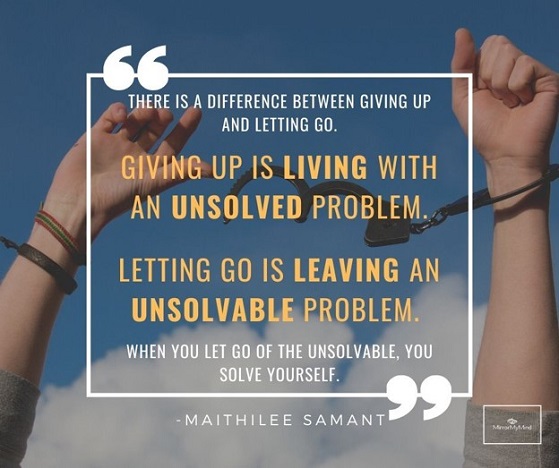Letting Go of Unsolvable Problems Is Not Giving Up.

{source}
Do you hate giving up on a problem or a project? Do you have an infectious can-do attitude? Are you a talented person who likes to help others?
If you answer two out of three as yes, then beware! You are one of the rare members of the society and a favorite target of skillful manipulators. You are what they call a sedulous person.
The dictionary defines sedulous as diligent, hardworking, and persistent. People like you have a positive attitude, they don’t give up, and they are reliable. They work to make a difference, and they don’t stop until the work is done. These strengths make you an excellent problem solver and an ideal workhorse.
However, the same strengths also make you susceptible to manipulation. You are also prone to get stuck into unsolvable problems.
The Lure of a Good Challenge
Now, another quick test for you. Consider the following:
I have a project that, once finished, will bring about a very positive change in people’s lives. It requires you to apply all your expertise and learn some new skills. There are lots of unknowns that you will need to figure out on your own. When you finish this project, you would have proven your worth and will get rewarded handsomely.
How likely are you to take on a project like this? Will you shy away from it, or will you take it on?
If you are willing or eager to take it on, congratulations, you again proved that you are sedulous. But this also shows how others can manipulate you. The challenges which are worthy and promising but vague can lure you into unsolvable problems or situations.
Now let me tell you something I bet you hate to hear: you can’t solve every single work or relationship problem that you decide to solve. You can’t solve everything just because you want to bring it to a resolution, nor can you finish everything you started.
I am not undermining your abilities. I know you believe you can do anything. That is all good, but this isn’t about you, it is about the problem itself.
Can-Do Attitude Is No Magic Wand. Some Problems Are Inherently Unsolvable.
Some problems are unsolvable. Period. No matter how much can-do attitude you have, no matter how hard you work, no matter how smart you are, you can’t solve them. It is not because of your approach that falls short, but because some problems have flawed problem definition. The best approach is to recognize this and let them go, and focus your attention on something else.
But if you are like me, I bet you hate giving up on a problem. I have seen many hardworking, tenacious, smart creatives giving their all to solve an unsolvable problem, only to end up getting progressively more exhausted and frustrated.
It drains energy, it takes a toll on their well being, and it keeps them very busy for a long time with a false hope for a resolution. “Maybe there is a way that I haven’t thought about it yet. Maybe if I try this, it will all work out…” they say to stay motivated in our continued efforts to solve the unsolvable.
Unsolvable situations can happen in work assignments or relationships. For a sedulous person, can-do translates to should be able to do anything and can’t quit. So they accept the responsibility for finding a solution to every problem and get busy. That is what makes them a perfect target to be trapped.
There are easy ways to find if the problem is unsolvable or not, and how to avoid the unsolvable, but we will come to that later. Let’s first see the mechanics of how you can be trapped.
The Commit-Persist Trap
Society has a seductive trap for its highly sedulous members. It works as follows.
1. Get sedulous people to commit to an unsolvable problem quickly.
2. Keep them stuck by encouraging their relentless efforts.
Get in and persist. If you want to take some time understanding the problem before committing, then you are called a procrastinator or commitment-phobic. If you realize you are in an unsolvable situation and want to get out, then you are called a quitter — a perfect trap for keeping someone stuck by channeling their own virtues.
The Quick Commit
We are progressively becoming a hurried civilization that desires all the problems to be solved instantly. Any issue, challenge, or problem triggers anxiety, and is expected to be worked on immediately. We are not encouraged to take the time to study the problem. Instead, we are encouraged to jump in and start working on a solution. Consider the following motivational quotes.
“Just go for it.”
“Don’t think. Just do.”
“Decide. Commit. Do it. Don’t waste time.”
“I wanted it yesterday.”
The intention behind this advice is to get rid of the procrastination and catapult us into action. It is this fear of procrastination that pushes us and others into a hurried commitment to solving a problem. The crucial step of problem assessment for its solvability is thus often skipped.
The Relentless Persistence
Then there is an overemphasis on not letting go of the problem until it is resolved.
Consider the following quotes:
“Never give up.”
“At first, if you don’t succeed, try and try again.”
“It does not matter how slow the progress is as long as you do not stop.”
What are we advised to do when we are struggling with a problem? Try harder.
What if we are struggling with it for a long time? Think smarter, go faster.
Harder. Faster. Try again with more energy! That is the advice that we get no matter what the nature of the problem is. However, any approach, no matter how diligently, persistently, and forcefully applied, will not resolve an unsolvable problem.
The Sedulous Burnout
The commit-persist trap undercuts the needed assessment of the problem and the situation. This makes it easy to fall for an unsolvable problem. And that results in years and years of effort without any real, tangible progress or outcome. It all amounts to enormous wastage of time and energy.
The tendency to commit, persist, and intensify efforts in the face of adversity are hallmarks of a sedulous personality. But not every person is sedulous. Most of the population is not. Most are wired to avoid and give up on even a solvable problem to stay in their comfort zone.
As a measure to prevent procrastination and prematurely giving up, society has been on an overdrive to bombard us with messages to encourage becoming highly and prematurely sedulous.
It has come to a point where those who resist the commit-persist trap are judged as lazy, procrastinators, and quitters. These are harsh judgments for anyone to face, but for a sedulous person, such verdicts are unbearable because it vastly mischaracterizes their self-image. Sedulous people are prone to stick around with the problem to prove to others that they have indeed done their best.
Breaking Free
As a life and career coach, I know the need and importance of having a sedulous mindset. However, I also see many sedulous people reaching out to me for help. They often approach to find yet another way to solve the unsolvable. When I understand the situation, I see an overworked, exhausted, high-integrity person stuck in an unsolvable premise.
These people are highly intelligent to discern what is unsolvable and what is not, but they subconsciously turn a blind eye to the reality for the sake of their principle of not giving up at any cost. Their high self-esteem demands that they finish what they committed to do. They tend to experience frustration, guilt, pressure, and eventually, burnout.
Only if these talented people use their diligence to assess the situation instead of rushing to solve everything, they will be more selective in the challenges they chose to take on. That will not only be good for their well-being, but also for the world, because their talents and efforts will start bearing fruit of real results.
Let us make an important distinction between unsolvable problems and hard-to-solve problems. Problems like world poverty, hunger, terrorism are hard-to-solve problems, but they are still solvable if we can create the right conditions.
In contrast, unsolvable problems are flawed problems that have elements like contradictions, limits, and unreasonable expectations.
Hard-to-solve problems are the ones that need our determination and grit. Unsolvable problems need our genius to recognize and transcend them.
Quit Without Feeling Guilty
If you have been working for a long haul and have noticed the following:
- You have not left any stone unturned, but still the situation you are in is not very different than when you started.
- Somebody else holds the criteria for the finish, and they change it just when you are about to be done. The definition of done shifts continuously.
- You don’t get the support from the environment or others who are contributors to the situation. You are doing it all alone, and people have started to take you for granted.
If the above applies to you, chances are you are stuck in an unsolvable, influenceable situation. More effort, more time, and more creativity are not going to change this situation. You need to let this go.
Quit being stuck in a dysfunctional relationship that only you have been working on for years. Let go of projects which never finish and drag on forever without any end in sight.
Don’t feel guilty. You are not giving up, you are letting go.
Letting Go Is Not the Same as Giving Up
When you clearly see that some problems are simply unsolvable, one more option opens up for you in addition to working hard and giving up. It is called letting go, and it is very different from giving up.
Giving up is living with an unsolved problem. Letting go is recognizing and leaving an unsolvable problem.
Letting go is not a New Age mantra applicable only to emotional matters, instead it is a very logical and sometimes the only effective option for some problems. Letting go is not disguised laziness, escapism, abandonment, or lack of lateral thinking. It is an act of a genius. Keep that option open for you.
Do the right thing for a problem. Study it for a long time before you commit to it. If it is fixable, fix it. If it is not, recognize that, quickly, and move on. Remaining stuck with more effort may look honorable and heroic, but it will never make you triumphant.
When you can see with absolute clarity that a problem is unsolvable, you will undoubtedly free yourself from it. When that happens, you feel relieved and at peace without feeling any shred of guilt or failure. When you let go of unsolvable, you solve yourself, and you set yourself free.
It doesn’t matter if others see you as a quitter, when you escape from a trap that was sucking the life out of you, don’t apologize, instead celebrate your freedom and find something else worthy of your effort.
***
Maithilee Samant has many diverse interests and expertise. She immerses herself in the domains of technology, leadership, art, writing, and life-coaching. In addition to holding a baccalaureate in Computer Science, Maithilee is also a certified life and career coach. Find out more about Maithilee and her work at her website.



